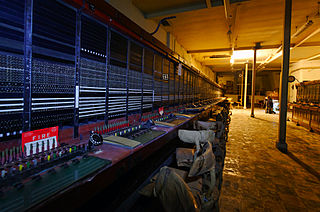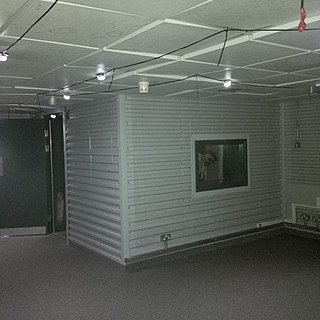Related Research Articles

Civil defense or civil protection is an effort to protect the citizens of a state from human-made and natural disasters. It uses the principles of emergency management: prevention, mitigation, preparation, response, or emergency evacuation and recovery. Programs of this sort were initially discussed at least as early as the 1920s and were implemented in some countries during the 1930s as the threat of war and aerial bombardment grew. Civil-defense structures became widespread after authorities recognised the threats posed by nuclear weapons.

The Federal Emergency Management Agency (FEMA) is an agency of the United States Department of Homeland Security (DHS), initially created under President Jimmy Carter by Presidential Reorganization Plan No. 3 of 1978 and implemented by two Executive Orders on April 1, 1979. The agency's primary purpose is to coordinate the response to a disaster that has occurred in the United States and that overwhelms the resources of local and state authorities. The governor of the state in which the disaster occurs must declare a state of emergency and formally request from the President that FEMA and the federal government respond to the disaster. The only exception to the state's gubernatorial declaration requirement occurs when an emergency or disaster takes place on federal property or to a federal asset—for example, the 1995 bombing of the Alfred P. Murrah Federal Building in Oklahoma City, Oklahoma, or the Space Shuttle Columbia in the 2003 return-flight disaster.
The Civil Contingencies Secretariat (CCS), created in July 2001 and disbanded in July 2022, was the executive department of the British Cabinet Office responsible for emergency planning in the UK. The role of the secretariat was to ensure the United Kingdom's resilience against disruptive challenge, and to do this by working with others to anticipate, assess, prevent, prepare, respond and recover. Until its creation in 2001, emergency planning in Britain was the responsibility of the Home Office. The CCS also supports the Civil Contingencies Committee, also known as COBR.

Serco Group plc is a British multinational defence, health, space, justice, migration, customer services, and transport company. It is headquartered in Hook, Hart, England. The company operates in Continental Europe, the Middle East, the Asia Pacific region, including Australia and Hong Kong, and North America. It is listed on the London Stock Exchange and is a constituent of the FTSE 250 Index.

Continuity of government (COG) is the principle of establishing defined procedures that allow a government to continue its essential operations in case of a catastrophic event such as nuclear war.

Emergency management is a science and a system charged with creating the framework within which communities reduce vulnerability to hazards and cope with disasters. Emergency management, despite its name, does not actually focus on the management of emergencies, Emergency management or Disaster management can be understood as minor events with limited impacts and are managed through the day-to-day functions of a community. Instead, emergency management focuses on the management of disasters, which are events that produce more impacts than a community can handle on its own. The management of disasters tends to require some combination of activity from individuals and households, organizations, local, and/or higher levels of government. Although many different terminologies exist globally, the activities of emergency management can be generally categorized into preparedness, response, mitigation, and recovery, although other terms such as disaster risk reduction and prevention are also common. The outcome of emergency management is to prevent disasters and where this is not possible, to reduce their harmful impacts.

His Majesty's Naval Base, Clyde, primarily sited at Faslane on the Gare Loch, is one of three operating bases in the United Kingdom for the Royal Navy. It is the navy's headquarters in Scotland and is best known as the home of Britain's nuclear weapons, in the form of nuclear submarines armed with Trident missiles.

His Majesty's Naval Service is the United Kingdom's naval warfare and maritime service. It consists of the Royal Navy, Royal Marines, Royal Fleet Auxiliary, Royal Naval Reserve, Royal Marines Reserve and Naval Careers Service. The Naval Service as a whole falls under the command of the Navy Board, which is headed by the First Sea Lord. This position is currently held by Admiral Sir Ben Key. The Defence Council delegates administration of the Naval Service to the Admiralty Board, chaired by the Secretary of State for Defence.

The United Kingdom Warning and Monitoring Organisation (UKWMO) was a British civilian organisation operating to provide UK military and civilian authorities with data on nuclear explosions and forecasts of fallout across the country in the event of nuclear war.
Mike Granatt is a public relations and communications professional, formerly a senior British civil servant, and the first head of the Civil Contingencies Secretariat of the Cabinet Office in 2001, the same year he was appointed a Companion of the Order of the Bath for "exceptional public service."

The Central Government War Headquarters (CGWHQ) is a 35-acre (14 ha) complex built 120 feet (37 m) underground as the United Kingdom's emergency government war headquarters – the hub of the country's alternative seat of power outside London during a nuclear war or conflict with the Soviet Union. It is in Corsham, Wiltshire, in a former Bath stone quarry known as Spring Quarry, under the present-day MoD Corsham. In 1940, during the Second World War, the site was acquired by the Minister of Aircraft Production and used as an underground engine factory. The war headquarters was commissioned in 1955, after approval by Prime Minister Anthony Eden. However, it became outdated shortly after it was built, due to intercontinental ballistic missiles being able to target it, and the formulation of other plans. Nevertheless, the complex continued to have a role in war plans and remained in operation for 30 years.
Babcock International Group plc is a British aerospace, defence and nuclear engineering services company based in London, England. It specialises in managing complex assets and infrastructure. Although the company has civil contracts, its main business is with public bodies, particularly the United Kingdom's Ministry of Defence and Network Rail. The company has four operating sectors, with overseas operations based in Africa, North America, South America, Europe and Australia.

Civil defense in the United States refers to the use of civil defense in the history of the United States, which is the organized non-military effort to prepare Americans for military attack and similarly disastrous events. Late in the 20th century, the term and practice of civil defense fell into disuse. Emergency management and homeland security replaced them.
The National Nuclear Laboratory is a UK government owned and operated nuclear services technology provider covering the whole of the nuclear fuel cycle. It is fully customer-funded and operates at six locations in the United Kingdom. Its customers have included the Nuclear Decommissioning Authority, Sellafield Ltd, Westinghouse, the Health and Safety Executive, the Ministry of Defence, the UK Atomic Energy Authority, VT Nuclear and British Energy. It also has links with academia, including collaborative agreements on waste immobilisation and disposal with the University of Sheffield and on nuclear materials research with the University of Manchester.
The National Emergency Management Agency is the public service department of New Zealand responsible for providing leadership and support around national, local and regional emergencies. It is an autonomous departmental agency hosted by the Department of Prime Minister and Cabinet. It replaced the Ministry of Civil Defence and Emergency Management in December 2019.

The Wartime Broadcasting Service is a service of the BBC that is intended to broadcast in the United Kingdom either after a nuclear attack or if conventional bombing destroyed regular BBC facilities in a conventional war. It is unclear if the Wartime Broadcasting Service is still operational as plans are kept mainly secretly with the BBC and government officials. According to an article by the BBC, recordings of a nuclear attack warning are still re-recorded and kept up to date periodically.
Rupert Christopher Soames OBE is a British businessman and the former chief executive of Serco from 2014 to 2023. He is a grandson of Winston Churchill, a nephew of one-time Defence Secretary Duncan Sandys and his wife Diana Churchill, of journalist Randolph Churchill, and of actress and dancer Sarah Churchill.
The Pakistan National Guard is a military reserve force and a component of the Pakistan Army, designed to act as a "second line of defence", together with the Pakistan Army Reserve and the Civil Armed Forces.
Many countries around the world have civil defense organizations dedicated to protecting civilians from military attacks and providing rescue services after widespread disasters. In most countries, civil defense is a government-managed and often volunteer-staffed organization.

Marian Brooke Rogers is a British psychologist who is a Professor of Behavioural Science and Security at King's College London where she is Vice Dean in the Faculty of Social Science and Public Policy (SSPP). She is a social psychologist who studies risk and threat. In 2014 she was asked to chair the Cabinet Office Behavioural Science Expert Group (BSEG). In 2019 she was appointed Chair of the Home Office Science Advisory Council (HOSAC). Professor Rogers was appointed to the Prime Minister's Council for Science and Technology in 2020.
References
- 1 2 "New Chief Executive of the Emergency Planning College" . Local Government Chronicle . 10 February 2003. Retrieved 12 October 2015.
- 1 2 "No secrets at The Hawkhills". The Press . 25 January 2000. Retrieved 10 October 2015.
- ↑ Doke, DeeDee (1 September 2003). "Crisis? What crisis?". The Guardian . Retrieved 11 October 2015.
- ↑ "Serco appointed to manage UK Emergency Planning College" (PDF) (Press release). Serco. 22 February 2010. Retrieved 10 October 2015.
- ↑ "Serco cashes in on the cuts with profit leap to £101 million". Evening Standard . 25 August 2010. Retrieved 10 October 2015.
- ↑ "PwC strengthens its corporate finance team in the region". The Yorkshire Post . 9 April 2013. Retrieved 10 October 2015.